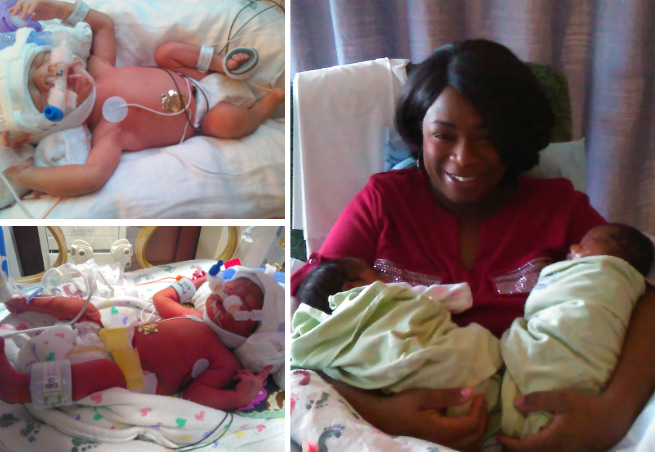Preemies and babies born with serious medical conditions have to work harder to learn certain skills. While babies discharged from the neonatal intensive care unit (NICU) probably won’t follow a traditional developmental timeline, they’ll likely meet expected milestones with extra support.
Reading Is Key to Babies’ Development
Children benefit from reading from birth. Reading together speeds up babies’ language acquisition, promotes brain development and provides an opportunity for parents and babies to bond, according to Reach Out and Read, a nonprofit organization that promotes the use of books in pediatric care and encourages families to read aloud together.
Developmental pediatrician Fadiyla Dopwell, M.D., of Pediatrix Developmental Medicine of Dallas, encourages parents to read to their babies in the NICU, as do the Pediatrix NICU teams at St. Luke’s Baptist Hospital in San Antonio, Memorial Hospital Miramar in South Florida and Emory Decatur Hospital in Georgia.
“Reading to babies early helps with forming an attachment and exposes them to structured language, which aids in language development,” Dr. Dopwell explained.
Major Milestones to Monitor
Babies develop at their own speed and in their own ways. To understand where a premature baby should be in terms of their development, clinicians go by the baby’s adjusted age or corrected age. To calculate your baby’s adjusted age, subtract the number of weeks your baby was born early from your baby’s actual age in weeks (the number of weeks since the date of birth). For example, the adjusted age for a baby born eight weeks ago who was three weeks early is 5 weeks old (8 - 3 = 5).
Actual Age - Weeks Born Early = Adjusted Age
Dr. Dopwell gives each family a set of handouts about what to expect, milestones to watch and how to grow their baby’s skills. The milestones are based on recommendations from the American Academy of Pediatrics and focus on aspects of development, such as motor skills and strengthening the baby’s core muscles. The milestones include:
- Making cooing sounds at 2 months adjusted age
- Rolling from front to back at 4 months adjusted age
- Rolling from back to front at 5 months adjusted age
- Saying “ma,” “da” and “ba” at 6 months adjusted age
- Saying “mama” and “dada” at 6 to 10 months adjusted age
- Sitting independently at 7 months adjusted age
- Crawling at 8 months adjusted age
- Walking at 12 to 16 months adjusted age
- Saying six to 10 words at 18 months adjusted age
- Saying up to 20 words at 21 months adjusted age
- Saying up to 50 words and short, two- to three-word sentences at 24 months adjusted age
At 2 years of age, the baby’s age is no longer adjusted for prematurity because most children have caught up to the rest of their peers developmentally.
How We Assess Your Baby’s Development After the NICU
If your baby was born prematurely and spent time in the NICU after delivery, you will likely want to see a pediatric developmental specialist to screen them for neurological or developmental disorders.
Pediatrix® Medical Group’s pediatric developmental-behavioral specialists are sensitive to the concerns and questions of parents regarding their child’s development. They evaluate a child’s gross motor, fine motor, language, cognitive and social/emotional development by performing diagnostic tests to determine the underlying cause. Gross motor skills involve large muscle movements, such as sitting independently, crawling and walking. Fine motor skills involve using smaller muscles, such as when drawing or grasping a bottle or pacifier.
“Whether a baby has complex issues or just suspected delays, we’re looking to see if they’ve hit the major milestones,” explained Dr. Dopwell. “When did they start talking and making sounds? When did they say their first word? When did they sit up by themselves? When did they crawl, and when did they walk? As we monitor the child’s motor skills, we also assess their language skills.”
Dr. Dopwell’s practice often meets babies and their parents in the NICU, then continues to follow the children for the next three years, sometimes longer if needed.
Joey and Nekeisha Harrison of McKinney, Texas, had premature twin girls in August 2016 on the same day that their first child, Katelyn, started first grade. Born nine weeks early, Zoey weighed 3 pounds, 12.3 ounces, and Ariana weighed 3 pounds, 1.7 ounces. Both girls stayed in the NICU for six weeks.


“The girls were quite small and fragile,” Nekeisha said. “Their underdeveloped nervous systems made them very sensitive, and initially, they weren’t able to take in enough nutrition.”
Once they reached their 36-week milestones, the twins were discharged and referred to Dr. Dopwell for follow-up care.
"In the midst of what seems like multiple appointments on a weekly basis, Dr. Dopwell offered such a calming environment and an educational and reassuring care experience,” Nekeisha said. “We had absolute trust in Dr. Dopwell.”
“Our practice is a little different than other NICU follow-up programs,” Dr. Dopwell said. “We see babies multiple times during their stay in the NICU. We establish a relationship with each family and provide guidance on what they can anticipate and how to navigate any complex issues. That gives us an advantage in supporting the families of premature babies; we get to know them pretty well before they come into the office, so we’re able to offer continuity of care. We also continue to see children past 3 years of age if they still need support.”
Joey and Nekeisha’s twins hit all of their expected developmental milestones by age 2 and are now vibrant, creative 7-year-olds. Recently, Ariana returned to Dr. Dopwell’s care.
“As we began to prepare the girls for school, we noticed Ariana was struggling to retain letter recognition and focus,” Nekeisha explained. “Over the years, we’ve maintained periodic check-ins with Pediatrix and consulted with them for various diagnostic testing needs. As a result, we learned that Ariana has dyslexia and was also recently diagnosed with attention-deficit/hyperactivity disorder.”
What Signs May Signal a Developmental Delay
Premature infants have an increased risk for language, cognitive, sensory and motor impairments.
“Some babies at 2 years old hit every milestone when expected, but others may need the extra time to catch up based on adjusted age.” Dr. Dopwell explained. “If a child hits that 24-month mark and their language skills are no longer progressing, we may refer them for speech therapy services.”
Extremely premature babies are at higher risk of motor disorders like cerebral palsy. If you notice that your baby is rigid, moves stiffly or seems “floppy” with loose limbs, it may be a sign of a motor disorder. While it may not be a cause for alarm, it is important to mention it at your baby’s next doctor’s appointment or to call a developmental pediatrician. Sudden changes in your child’s muscle tone should be communicated immediately to your pediatrician.
Another aspect of development to monitor is how well your baby feeds. Some may have trouble breastfeeding or holding a bottle, while other premature children may have a sensory disorder that makes them gag when they’re introduced to certain food textures. Therapy with a feeding specialist can help.
“Fine motor skills develop as a baby’s gross motor skills develop, so learning to feed themselves with their hands and eventually with utensils will also help them learn to scribble, draw and write as they get older,” Dr. Dopwell explained.
The most important expert to tap into is yourself, she said.
“You know your baby better than anyone,” she said. “If you have any concerns about your child’s growth and development, let your baby’s provider know. Early intervention is the best way we can help them improve and progress.”
“Our experience with Dr. Dopwell has been amazing,” Nekeisha said. “She has listened intently, assuaged our concerns, abated our fears, laughed with us, taught us and simply taken this journey with us.”
